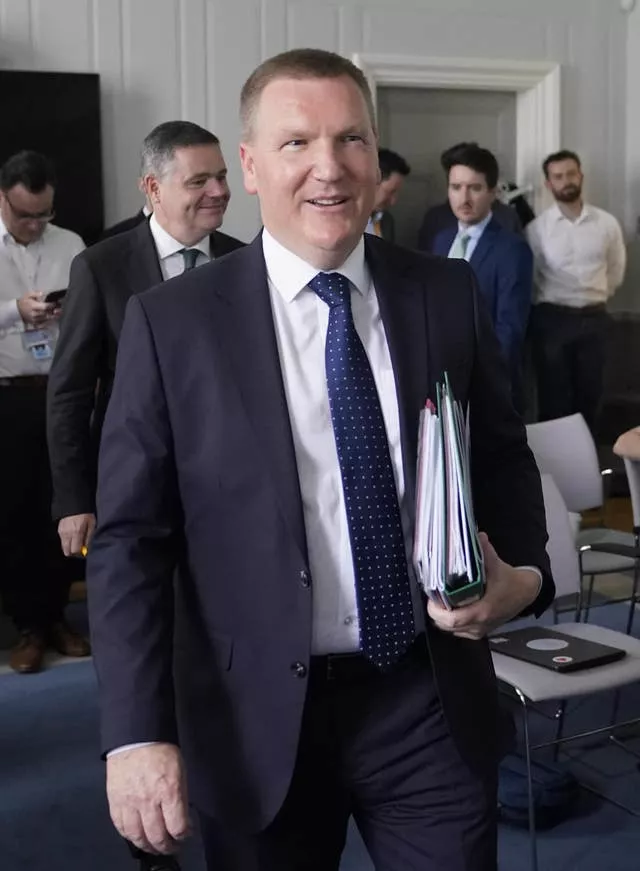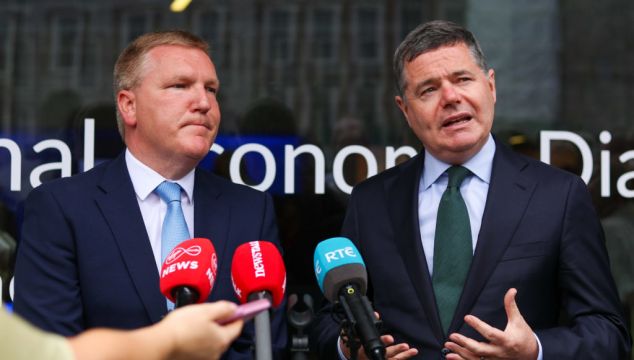A watchdog has warned the Government not to “repeat past mistakes” as it argued that a large budgetary package is not needed this year.
The Irish Fiscal Advisory Council (IFAC) has said that the economy is in an “unusually strong position” and should not be stimulated further through measures in Budget 2024.
The Government has set its budgetary envelope at €6.4 billion, with additional public spending measures worth €5.2 billion and taxation changes costing an extra €1.1 billion.
Ministers have defended the planned 6.1 per cent increase in core spending as necessary as grocery and electricity prices remain high, even though it is another breach of its 5 per cent spending rule set out in the Programme for Government.
The IFAC said that it has concerns over the manner in which the Government changed its plans in the Summer Economic Statement, revealed in July, to an approach that would see the spending rule breached every year until 2026.
This would see core net spending by €4 billion higher by 2026 than the spending rule allow, according to the IFAC, which called the breaches “serious”.
IFAC chief economist Dr Eddie Casey said Budget 2024 would need to be worth €900 million less to stay within the 5 per cent spending rule limit.
“Such concerns weaken the credibility of Government projections, they lack transparency, and still don’t factor in overruns and costs related to population ageing and the climate transition,” acting IFAC chair Professor Michael McMahon said.
He said that spending overruns are now at €1.1 billion, with Mr Casey stating that health overruns could amount to between €500 million and €1 billion.
Mr McMahon also said that one-off measures and a temporary deviation from the spending rule were easier to allow last year at a time of great uncertainty politically, as well as financially.
He said the argument for “blanket”, or universal, measures to help households with inflation this year was not as straightforward.
“There is little to no justification for further temporary non-core measures. With energy prices falling, temporary measures, particularly if untargeted, risk adding to price pressures,” he said.
“It wasn’t just that prices were high, it was, in fact, the huge uncertainty that I think more justifies that sort of targeted support last winter.
“It’s also quite apparent that there are households in the Irish economy who are doing quite well. There are sectors of the economy and parts of the labour market where pay growth has been at least compensating for high inflation – if not exceeding it.
“So in that world, certainly a blanket approach to energy support does not make a lot of sense from a macroeconomic or fiscal stance, in our view.”
Asked about a windfall tax on energy companies’ profits, where it was collected by Government and paid back to customers, Mr McMahon said that it would need to be carefully costed to ensure it is “truly” cost neutral.
“For a lot of these policies, I think a targeting of them is really what the Government has in mind, and so they have to be carefully designed, but again, if they are genuinely revenue neutral, we would not take a particular stance on them.”

Mr McMahon, who was appointed to the role in July, advised the Government to stick to the spending rule, and said there is a need for “tough choices” and better long-term planning.
He said tax returns over the last year reflected a “strong economy”, and pointed to the latest Exchequer returns that show income tax is cumulatively up 8.2 per cent year-on-year, and up 3.8 per cent for the month of August.
“But strong revenues should not be taken to mean a war chest of resources to distribute, just as weak revenues should not necessarily be interpreted as a risk to budget measures,” he said.
He added that relying on corporate tax revenues threatened to “echo the reliance on housing related taxes before the financial crash” in the 2000s.
“The ongoing reliance on corporate tax is risky given its volatility and potential unreliability. While August has been a strong CT (corporate tax) month recently, receipts were down about one billion, about 36 per cent, compared to 2022, though these are still high by historical standards.
“But this just highlights the unreliability of corporate tax receipts where one third is accounted for by just three groups. We’ve argued, and the Government seems to have largely accepted the argument, that some of these CT returns should be treated as windfalls.
“Relying on volatile and concentrated revenue for permanent spending is a costly mistake that echoes the reliance on housing related taxes before the financial crisis.
“This is not a mistake we should wish to repeat.”
According to IFAC calculations, it will cost €4.6 billion to “stand still” next year; the Government has allocated €4.3 billion to additional core current spending in its Summer Economic Statement.
Budget 2023 was worth a record €11 billion as the Government sought to grapple with the cost-of-living crisis; this included a package of one-off measures worth €4.1 billion.
Budget 2024 is due to be unveiled on Tuesday, October 10th, and the Government has confirmed there will once again be one-off measures, but the details are not yet known.
Asked about IFAC’s previous criticisms of Government spending, Mr McMahon said: “It is our job to set the constraints and explain what the rules that the Government has designed themselves mean for their fiscal planning, and to criticise where their approaches to that planning or their particular timing of policies is, in our view, imperfect for the economy.
“Of course, there is a big red button where we don’t endorse (the budget), but I think the bar for doing that should be relatively high.”







